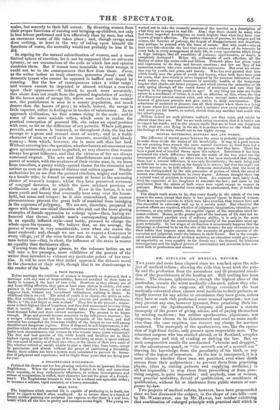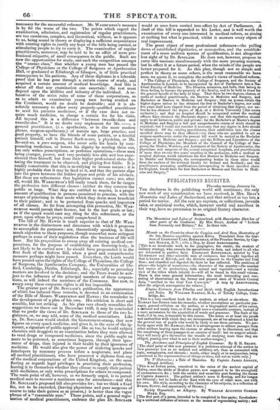DR. SINCLAIR ON MEDICAL REFORM.
Two years and more have elapsed since we touched upon the sub- ject of medical reform ; showing the evils that beset both the pub- lic and the profession from the anomalous and ill-protected condi- tion of the practitioners of the healing art. Still nothing has been done. The doctors, (physicians,) though the highest class of the profession, remain ;he worst medically-educated, unless they edu- cate themselves : the surgeons, all things considered the best medically-educated class, cannot send medicine to their patients, or legally recover for any advice or attendance they have given, unless they have at each visit performed some manual operation; nor can they prevent any one, however ignorant, from practising their im- portant art : the Apothecaries Company still possess a statute monopoly of the power of giving advice, and of paying themselves by sending medicine ; but neither apothecaries, physicians, nor surgeons, who choose to be disinterested and send no more medi- cine than the case requires, can recover any charge for services rendered. The monopoly of the apothecaries, too, like the opera- tion of high fiscal duties, only presses upon respectable men. The educated surgeon who has studied abroad, or in Scotland, scruples the disrepute and risk of evading or defying the law. But no such compunction assails the uneducated "chemist and druggist," or the adventurous quack, or "the seventh son of a seventh son" drawing his knowledge from the peculiarity of his birth, or any other of the legion of impostors. As the law is interpreted, it is a mere chance whether these men are punished, even when death ensues from their malpractices : to prevent them from practising physic, (that is, visiting patients and supplying medicine,) is all but impossible : to stop them from prescribing or from prac- tising surgery, is quite impossible : and anybody, man or woman, may practise midwifery, devoid of qualification, or semblance of qualification, without let or hindrance from public statute or cor- porate by-law. Two projects of medical reform, however, have been propounded since we last discussed the subject, in the shape of two bills—one by Mr. WARBURTON, one by Mr. Ilawss, but neither exhibiting that combination of enlarged principle with practical skill which is necessary for the successful reformer. Mr. WARBURTON'S measure is by far the worse of the two. The points which regard the examination, admission, and registration of regular practitioners, are too cumbrous, complex, and theoretical, without, as it appears to us, being sound in theory or displaying a sufficient acquaintance with existing rights to justify any hope of the bills being carried, or stimulating people to try to carry it. The examination of regular practitioners, moreover, may be said to be an affair of mere pro- fessional etiquette, of small consequence to the public. Such are now the opportunities for study, and such the competition amongst the " uneasy class," that whether a young man has passed the College of Physicians or the College of Surgeons or Apothecaries Hall, or graduated at Edinburgh or Glasgow, is of little practical consequence to his patients. Any of these diplomas is a tolerable proof that he has gone through a certain course of study, and acquired a certain amount of medical knowledge. And this is about all that any examination can ascertain : the rest must depend upon the abilities and industry of the individual. A re- la.xation of the Strict rules of some of these corporations, so as to admit to examination young men having studied on the Continent, would no doubt be desirable; and it is ab- solutely necessary to allow every properly-qualified practitioner to send his patients medicines, or if the case does not re- quire much medicine, to charge a certain fee for his visits. All beyond this is a difference " between tweedle-dum and tweedle-dee.' It is no doubt very unpleasant for Mr. —, a general practitioner, (i. e. apothecary, or in the more modern phrase, surgeon-apothecary,) of mature age, large practice, and good property, to have the friends of some patient, or a fanciful patient himself, call in Doctor Such-a-one, a physician, or Mr. So-and-so, a pure surgeon, who never soils his hands by com- pounding medicines, or lowers his dignity by sending them out, but only writes prescriptions, or performs operations,—these men being younger, poorer, and very probably less able and less expe- rienced than himself, but from their higher professional status dic- tating the treatment to be observed, and playing first fiddle. It is readily conceivable that this is mortifying to human nature : it is highly probable that it may be fatal to it, and that the patient slips into the grave between the hidden pique and pride of his advisers. But these are refinements that legislation cannot cure ; nor, after all, would Mr. WAasineroN's bill really touch them, for he ranges the profession into different classes: neither do they concern the public at large. What they are entitled to require, is a proper amount of qualification in persons permitted to practise, with the means of practising in that mode which they deem most beneficial to their patient ; and to he protected frOna quacks and impostors of all classes. So far from attempting this protection, Mr. WAR- BURTON would permit their licence, but in the last grade or list ; as if the quack would care any thing for this refinement, or the poor, upon whom he preys, could comprehend it.
The bill of Mr. Hawss is much superior to that of Mr. WAR- BURTON in the distinctness and directness with which it proposes to accomplish its purposes: nor, theoretically speaking, is there much objection to these purposes, though somewhat more stringent perhaps in some of their regulations than the business of life will bear. But his proposition to sweep away all existing medical cor- porations, for the purpose of establishing one licensing-body, is not likely to be carried now : be should have propounded it in the first flush of the Reform Bill, when a good and comprehensive measure perhaps might have passed. Even then, the Lords would have paused upon the rights of the College of Physicians, the College of Surgeons, the Apothecaries Company, the Universities of Ox- ford, Cambridge, Dublin, Edinburgh, &c., especially as pecuniary matters are involved in the decision ; and the Peers would be sub- ject to the influence of the principal members of these corpora- tions, as will indeed the members of the Commons. But now, to sweep away these corporate rights is all but impossible. The greater part of Dr. SINCLAIR'S publication, the appearance of which has induced these remarks, is devoted to an examination of the Bills of Messrs. WARBURTON and HAWES ; the remainder to the development of a plan of his own. His criticism is short and sensible, but not striking. As his plan very closely resembles the suggestions we threw out in December 1839, it may be concluded that we prefer the views of Dr. SINCLAIR to those of the two le- gislators, or, we may add, some of the medical associations. Like us, Dr. SINCLAIR would abolish the Government-stamp, that now
figures on every quack medicine, and gives it, in the eyes of the ig- norant, a signature of public approval: like us too, he would subject chemists and druggists to an examination before they were allowed to vend drugs or compound medicines, since the public ought no
more to be poisoned, as sometimes happens, through their igno- rance of drugs, than injured in their health by their ignorance of medicine. He would also give the power of mulcting quacks and interlopers by summary process before a magistrate, and place all medical practitioners, who have procured a diploma from any of the medical corporations of the United Kingdom, on the same footing as regards legal privileges in practising their profession, leaving it to themselves whether they choose to supply their patient with medicines, or only write prescriptions for others to compound. The main point of all, however, as we formerly urged, is to permit medical men to recover a maximum sum for attendance—and this Dr. &smug's proposed bill also provides for ; but we think a fixed fee, not to be exceeded, (leaving physicians and pure surgeons of course to take their guinea as at present,) is better than the vague phrase of a " reasonable sum." These points, and a general regis- tration of medical practitioners, embrace the plan Dr. Somers would at once have carried into effect by Act of Parliament. A draft of this bill is appended to his Letter, and is well worth the examination of every one interested in medical reform, as aiming at nothing but what is practical, whilst it answers every object of real improvement.
The great object of most professional reformers—the pulling down of established dignitaries, or monopolies, and the establish- ment of a more uniform system of qualification, is not altogether lost sight of by Dr. Szwor,.sta. He does not, however, propose to carry this measure simultaneously with the more pressing matters, but to effect it at a future period, when the minds of the people are better prepared for it. As this plan, though not so simple and perfect in theory as some others, is the most reasonable we have seen, we quote it, to complete the author's views of medical reform. " The College of Physicians, the College of Surgeons, and the Society of Apothecaries in London, to be incorporated by Act of Parliament into a Na. tional Faculty of Medicine. The libraries, museums, and halls, that belong to these bodies, to become the property of the faculty, and to be held in trust for the general benefit of the body at large. That there be two degrees, classes, or ranks of medical practitioners, viz. Doctors in Medicine and Surgery, and Bachelors or Masters in Medicine and Surgery ; that no person obtain the higher degree unless he has obtained the first or Bachelor's degree, nor until five years shall have elapsed from the period of obtaining that degree, nor un- less be has obtained the decree of M,A. at a British -University [this seems exclusive]; and that no hospital should be recognized unless the medical officers have obtained the Doctorate degree; and that this regulation should apply to all lecturers, public and private : for the Bachelor's or Master's degree in Medicine and Surgery a full and comprehensive course of study should be enjoined; but I would not consider it necessary that any degree in Arts should he obtained. Of the existing practitioners, their subdivision into the classes specified above may be thus effected—viz. those who are qualified to act at surgeon-apothecaries under the present bill would be ranked as the Bachelor or Masters in Medicine and Surgery ; and the Fellows and Licentiates of the College of Physicians, the Members of the Council of the College of Sur- geons, the Master, Wardens, and Assistants of the Society of Apothecaries, the. physicians and surgeons of the several recognized hospitals, and practitioners of more than twenty-five years' standing in the profession, with a medical or surgical diploma, would constitute the first Doctors in Medicine and Surgery. In surgical and Edinburgh, the corresponding bodies in these cities would
form the nucleus of the national faculty for Ireland and Scotland ; and the practitioners possessing qualifications corresponding to those specified above for England, would form the first Bachelors or Masters and Doctors in Medi- cine and Surgery."



























 Previous page
Previous page